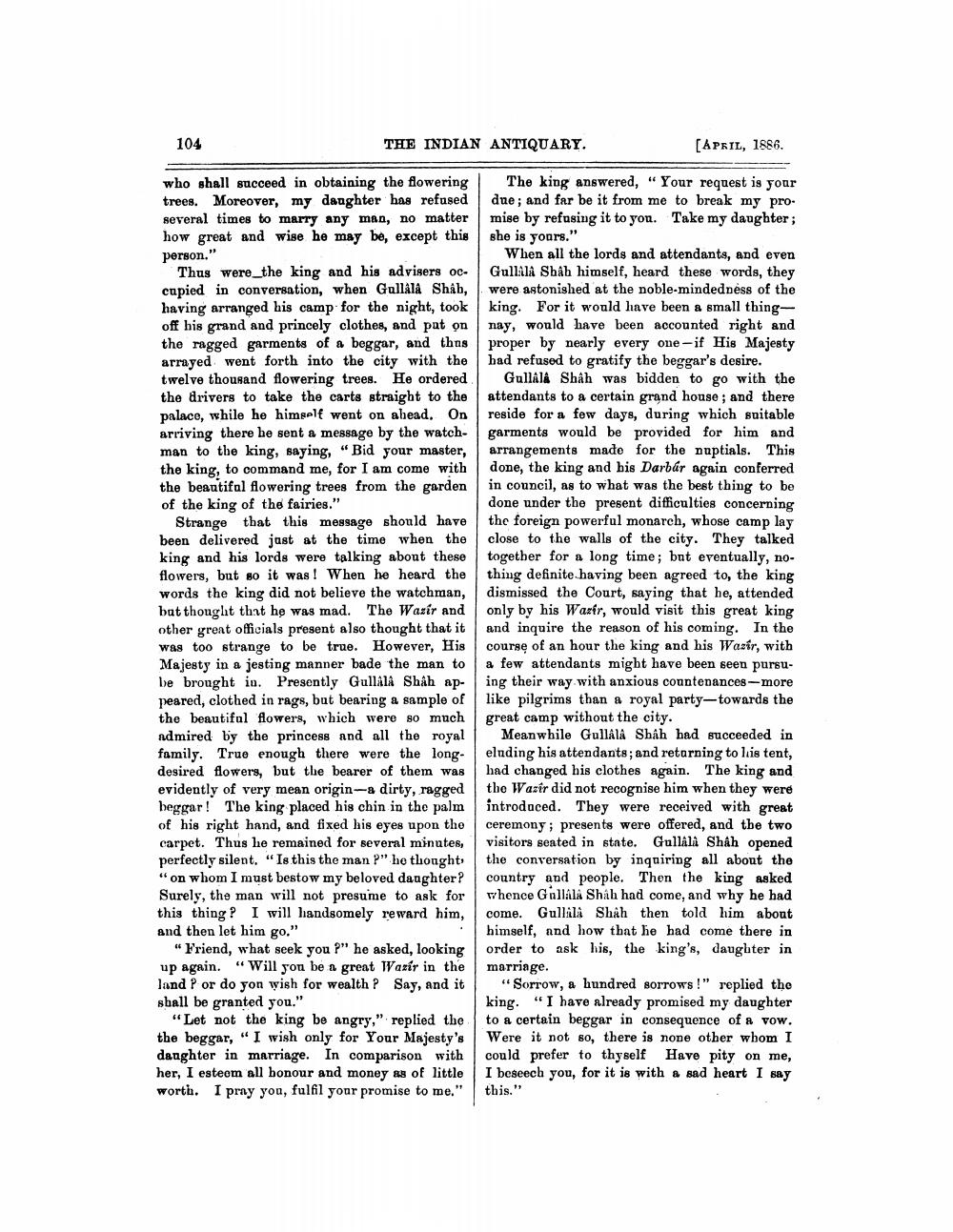________________
104
THE INDIAN ANTIQUARY.
who shall succeed in obtaining the flowering trees. Moreover, my daughter has refused several times to marry any man, no matter how great and wise he may be, except this person."
Thus were the king and his advisers occupied in conversation, when Gullâlâ Shâb, having arranged his camp for the night, took off his grand and princely clothes, and put on the ragged garments of a beggar, and thus arrayed went forth into the city with the twelve thousand flowering trees. He ordered. the drivers to take the carts straight to the palace, while he himself went on ahead. On arriving there he sent a message by the watchman to the king, saying, "Bid your master, the king, to command me, for I am come with the beautiful flowering trees from the garden of the king of the fairies."
Strange that this message should have been delivered just at the time when the king and his lords were talking about these flowers, but so it was! When he heard the words the king did not believe the watchman, but thought that he was mad. The Wazir and other great officials present also thought that it was too strange to be true. However, His Majesty in a jesting manner bade the man to be brought in. Presently Gullâlâ Shâh appeared, clothed in rags, but bearing a sample of the beautiful flowers, which were so much admired by the princess and all the royal family. True enough there were the longdesired flowers, but the bearer of them was evidently of very mean origin-a dirty, ragged beggar! The king placed his chin in the palm of his right hand, and fixed his eyes upon the carpet. Thus he remained for several minutes, perfectly silent. "Is this the man ?" he thought "on whom I must bestow my beloved daughter? Surely, the man will not presume to ask for this thing? I will handsomely reward him, and then let him go."
[APRIL, 1886.
The king answered, "Your request is your due; and far be it from me to break my promise by refusing it to you. Take my daughter; she is yours."
When all the lords and attendants, and even Gullila Shah himself, heard these words, they were astonished at the noble-mindedness of the
king. For it would have been a small thingnay, would have been accounted right and proper by nearly every one-if His Majesty had refused to gratify the beggar's desire.
Gullâlâ Shah was bidden to go with the attendants to a certain grand house; and there reside for a few days, during which suitable garments would be provided for him and arrangements made for the nuptials. This done, the king and his Darbár again conferred in council, as to what was the best thing to be done under the present difficulties concerning the foreign powerful monarch, whose camp lay close to the walls of the city. They talked together for a long time; but eventually, nothing definite having been agreed to, the king dismissed the Court, saying that he, attended only by his Wazir, would visit this great king and inquire the reason of his coming. In the course of an hour the king and his Wasir, with a few attendants might have been seen pursuing their way with anxious countenances-more like pilgrims than a royal party-towards the great camp without the city.
Meanwhile Gullâlâ Shâh had succeeded in eluding his attendants; and returning to his tent, had changed his clothes again. The king and the Wazir did not recognise him when they were introduced. They were received with great ceremony; presents were offered, and the two visitors seated in state. Gullâlâ Shah opened the conversation by inquiring all about the country and people. Then the king asked whence Gallala Shah had come, and why he had come. Gullilà Shah then told him about himself, and how that he had come there in order to ask his, the king's, daughter in marriage.
"Friend, what seek you ?" he asked, looking up again. "Will you be a great Wazir in the land ? or do you wish for wealth? Say, and it shall be granted you."
"Let not the king be angry," replied the the beggar, "I wish only for Your Majesty's daughter in marriage. In comparison with her, I esteem all honour and money as of little worth. I pray you, fulfil your promise to me."
"Sorrow, a hundred sorrows!" replied the king. "I have already promised my daughter to a certain beggar in consequence of a vow. Were it not so, there is none other whom I could prefer to thyself Have pity on me, I beseech you, for it is with a sad heart I say this."




